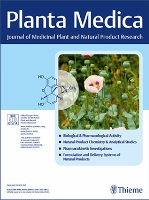
PLANTA MEDICA
Scope & Guideline
Charting New Territories in Herbal Research
Introduction
Aims and Scopes
- Research on Medicinal Plants and Natural Products:
The journal publishes studies on the pharmacological effects, efficacy, and safety of various medicinal plants, exploring their potential as therapeutic agents. - Chemical Analysis and Characterization:
Research articles often include detailed chemical profiling of plant extracts, identifying bioactive compounds and their mechanisms of action, which is crucial for the development of herbal medicines. - Ethnopharmacology and Traditional Medicine:
PLANTA MEDICA emphasizes the importance of traditional knowledge and ethnobotanical studies, promoting the integration of indigenous practices with scientific validation. - Innovative Drug Development:
The journal supports research that explores the potential of natural products in drug discovery, including the development of new formulations and delivery systems. - Pharmacokinetics and Toxicology:
Studies assessing the pharmacokinetic profiles, bioavailability, and safety of herbal products are prominently featured, addressing regulatory and clinical implications.
Trending and Emerging
- Cannabinoid Research:
An increasing number of studies focus on cannabinoids derived from cannabis, exploring their therapeutic potential and mechanisms of action, especially in relation to pain management and inflammation. - Natural Products in COVID-19 Research:
Research investigating the antiviral properties of medicinal plants against SARS-CoV-2 and their potential roles in COVID-19 prevention and treatment has surged, highlighting the relevance of natural products during the pandemic. - Sustainable Extraction Methods:
There is a growing trend towards the development of eco-friendly and sustainable extraction techniques for bioactive compounds from plants, reflecting an increase in environmental awareness among researchers. - Phytochemicals and Gut Health:
Studies examining the role of phytochemicals in gut microbiota modulation and their implications for gastrointestinal health are on the rise, emphasizing the connection between diet, health, and natural products. - Bioinformatics and Metabolomics:
The integration of bioinformatics and metabolomic approaches in studying the chemical diversity of plant species and their biological activities is increasingly popular, allowing for more comprehensive analyses.
Declining or Waning
- Traditional Herbal Remedies:
There has been a noticeable decrease in articles focusing solely on traditional herbal remedies without scientific backing, as the journal increasingly emphasizes evidence-based research. - General Ethnobotanical Surveys:
While ethnobotanical studies remain relevant, there has been a decline in general surveys that do not tie findings to specific pharmacological or therapeutic outcomes. - Historical Use of Medicinal Plants:
Research centered around the historical use of plants without contemporary relevance or application has become less frequent, as the journal shifts towards more practical and applicable studies. - Non-Phytochemical Studies:
There is a waning interest in studies that do not involve phytochemical analysis or do not connect to pharmacological outcomes, as the journal prioritizes articles that integrate chemistry with biological activity.
Similar Journals

Journal of Natural Medicines
Connecting Ancient Wisdom with Contemporary ScienceJournal of Natural Medicines, published by SPRINGER JAPAN KK, is a leading academic journal that plays a pivotal role in the advancement of research in the fields of Complementary and Alternative Medicine, Drug Discovery, Molecular Medicine, Organic Chemistry, and Pharmaceutical Science. Established in 1994 and set to continue until 2024, this journal serves as a vital conduit for the dissemination of groundbreaking research and innovative ideas that bridge traditional medicinal knowledge and modern scientific inquiry. With its impressive ranking in Scopus—ranking #12 out of 105 in Complementary and Alternative Medicine and holding a Q1 category quartile for 2023—it stands as a reputable source for high-quality, peer-reviewed articles. The journal's commitment to excellence is further underscored by its inclusion in the Springer network, providing researchers, professionals, and students with valuable insights and the latest developments in natural medicines. Although this journal operates under a subscription model, its profound impact on these interdisciplinary fields makes it an essential resource for anyone engaged in the study or practice of natural medicinal therapies.

Revista Brasileira de Farmacognosia-Brazilian Journal of Pharmacognosy
Exploring the Frontiers of Pharmacognosy.Revista Brasileira de Farmacognosia-Brazilian Journal of Pharmacognosy, published by SpringerNature, stands at the forefront of scientific exploration in the field of pharmacology, toxicology, and pharmaceutics. With an impressive Q2 ranking in the 2023 category concerning miscellaneous pharmacological sciences and a commendable Scopus rank of #30 out of 80, this journal serves as a crucial platform for disseminating innovative research and advancements in pharmacognosy. The journal, which has been a vital part of the academic landscape since 2007, seeks to facilitate open access to knowledge for researchers, professionals, and students, thereby fostering a collaborative community dedicated to enhancing understanding of medicinal resources and their applications. Through rigorous peer review and a commitment to quality, the Brazilian Journal of Pharmacognosy aims to advance the frontiers of pharmaceutical sciences and promote the sustainable use of natural products in Brazil and beyond.

ARCHIVES OF PHARMACAL RESEARCH
Elevating the standards of pharmacological research since 1978.Archives of Pharmacal Research, published by the Pharmaceutical Society of Korea, is a leading journal in the fields of drug discovery, molecular medicine, and organic chemistry. With an illustrious history spanning from 1978 to 2024, this peer-reviewed journal has earned a remarkable reputation, achieving a Q1 category ranking in each of its primary research areas as of 2023. Ranked #9 in Organic Chemistry and #12 in Drug Discovery among their respective fields, Archives of Pharmacal Research showcases cutting-edge research that contributes significantly to scientific advancements. Although it is not an open-access journal, its impactful publications are crucial resources for researchers, professionals, and students navigating the complexities of pharmacological sciences. The journal's continued commitment to disseminating high-quality research underlines its importance in fostering innovation and expanding knowledge within the pharmaceutical landscape.
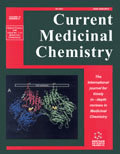
CURRENT MEDICINAL CHEMISTRY
Exploring Innovations in Drug Design and Discovery.Current Medicinal Chemistry is a leading journal published by Bentham Science Publishers Ltd, known for its rigorous focus on the multifaceted realm of medicinal chemistry. With an ISSN of 0929-8673 and E-ISSN 1875-533X, the journal plays a crucial role in disseminating high-quality research findings that bridge the gap between chemistry and health sciences. Operating from Sharjah, United Arab Emirates, it has been a prominent scholarly resource since its inception in 1994, and is expected to continue until 2024. Current Medicinal Chemistry has earned its place in the academic community with an impressive impact factor and categorization in Q1 and Q2 quartiles across various disciplines, including Organic Chemistry, Biochemistry, Drug Discovery, and Pharmacology, highlighting its substantial contribution to these fields. Notably, it ranks 24th in Organic Chemistry and is within the 88th percentile, underscoring its appeal to researchers, professionals, and students alike who are keen on exploring cutting-edge advancements in drug design and development. Although it is not an open-access journal, it provides vital content that informs and inspires innovation in medicinal chemistry, appealing to a global audience committed to enhancing human health through scientific discovery.
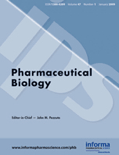
PHARMACEUTICAL BIOLOGY
Bridging the Gap Between Biology and Pharmaceutical ApplicationsPHARMACEUTICAL BIOLOGY, published by Taylor & Francis Ltd, is a prominent open-access journal that has been a cornerstone of research in the life sciences since its convergence in 1961. With a strong focus on Complementary and Alternative Medicine, Pharmaceutical Science, and Drug Discovery, this journal is dedicated to disseminating groundbreaking research that intersects pharmaceuticals and biology. Acknowledged for its rigorous peer-review process, it holds a prestigious Q1 ranking in Pharmaceutical Science and exemplifies the commitment to quality and impact in the field, boasting an impressive Scopus rank of #14/105 in the complementary and alternative medicine category. Researchers keen on advancing their knowledge in these fields will find PHARMACEUTICAL BIOLOGY an invaluable resource, offering accessibility since its shift to open access in 2017. This journal presents a platform for innovative studies that contribute to the evolving understanding of pharmaceutical applications and biological interactions, serving as an essential hub for researchers, professionals, and students alike.
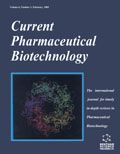
CURRENT PHARMACEUTICAL BIOTECHNOLOGY
Pioneering Research in Pharmaceutical Science and BiotechnologyCURRENT PHARMACEUTICAL BIOTECHNOLOGY is a prestigious academic journal dedicated to advancing the field of pharmaceutical biotechnology by publishing high-quality research articles, reviews, and innovatory methodologies. Published by Bentham Science Publishers Ltd, this journal has established a strong reputation in its field, reflected in its 2023 Scopus rankings: it holds an impressive Q2 classification in Pharmaceutical Science and Q3 in Biotechnology, indicating its significant impact within these disciplines. With an ISSN of 1389-2010 and an E-ISSN of 1873-4316, CURRENT PHARMACEUTICAL BIOTECHNOLOGY provides a reliable platform for disseminating valuable research findings and fostering collaboration among researchers, professionals, and students alike. The journal covers a wide array of topics, from drug development and delivery systems to innovative biotechnological techniques, thus serving as an essential resource for anyone interested in the cross-section of pharmaceutical science and biotechnology. Researchers can access a diverse range of articles that explore both theoretical frameworks and practical applications, reflecting the ongoing evolution and challenges in this dynamic field.

Journal of Pharmacy & Pharmacognosy Research
Empowering Research in Pharmaceutical SciencesJournal of Pharmacy & Pharmacognosy Research, published by JOURNAL PHARMACY & PHARMACOGNOSY RESEARCH-JPPRES, is a prominent open-access journal established in 2013, headquartered in Antofagasta, Chile. With a focus on the fields of Complementary and Alternative Medicine, Drug Discovery, Pharmaceutical Science, Pharmacology, and Pharmacy, this journal is recognized for its commitment to advancing research and disseminating knowledge within these important areas. With a current impact factor that reflects its academic rigor and relevance, the journal has achieved substantial recognition, evident by its Q2 and Q3 quartile rankings in multiple categories, indicating its growing influence on the scientific community. The Scopus rankings further highlight its standing in pharmacy and pharmacological disciplines, providing a valuable platform for researchers, professionals, and students to share their findings and insights. With its open access model, the journal ensures that high-quality research is available to a global audience, paving the way for collaborative advancements in pharmaceutical sciences.

Pakistan Journal of Pharmaceutical Sciences
Delivering critical studies that shape the pharmaceutical landscape.Pakistan Journal of Pharmaceutical Sciences, published by the University of Karachi, serves as a vital platform for advancing research in the field of pharmaceutical sciences. With a strong commitment to disseminating innovative findings and critical studies since its inception in 1995, the journal focuses on a wide array of topics including pharmacology, toxicology, and pharmaceutics. With an ISSN of 1011-601X, it holds a reputable position within the academic community, reflecting its Q3 category ranking in Pharmaceutical Science as of 2023. While the journal is currently not designated as Open Access, it remains accessible through institutional subscriptions, ensuring that both emerging and established researchers can contribute to and benefit from its scholarly content. This publication not only promotes scientific dialogue but also aims to bridge the gap between academia and industry, appealing to a diverse audience of researchers, professionals, and students seeking to stay informed about the latest advancements and trends in pharmaceutical research.

Jundishapur Journal of Natural Pharmaceutical Products
Unveiling the Potential of Nature’s RemediesJundishapur Journal of Natural Pharmaceutical Products, published by BRIEFLAND in the Netherlands, serves as a pivotal platform for researchers and professionals in the realm of pharmacology and toxicology. With its ISSN 1735-7780 and E-ISSN 2228-7876, the journal has established itself since its inception in 2011, showcasing a commitment to advancing knowledge in natural pharmaceutical products through innovative research. In 2023, it earned a commendable ranking in the Q3 category for Pharmacology, Toxicology, and Pharmaceutics, reflecting its contribution to the field as evidenced by its position in the Scopus rankings. The journal aims to publish high-quality research articles, reviews, and case studies that explore the potential benefits and toxicological aspects of natural products. Although it currently does not offer open access, its rigorous peer-review process ensures that only impactful studies are disseminated, ultimately facilitating a deeper understanding of natural pharmaceutical innovations. For those engaged in this exciting and evolving field, Jundishapur Journal of Natural Pharmaceutical Products is an essential resource that not only expands scholarly discourse but also promotes safe practices in natural product utilization.
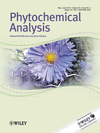
PHYTOCHEMICAL ANALYSIS
Transforming Knowledge into Application in Plant SciencesPHYTOCHEMICAL ANALYSIS is a renowned journal published by WILEY that serves as a vital resource in the fields of analytical chemistry, biochemistry, and plant sciences, among others. With an ISSN of 0958-0344 and an E-ISSN of 1099-1565, this journal has been at the forefront of phytochemical research since its inception in 1990, with a commitment to advancing knowledge up to 2024. Notably, it boasts impressive Scopus rankings, including a Q1 quartile in Complementary and Alternative Medicine, highlighting its significant impact in this area. The journal provides essential insights into phytochemical analysis for a diverse audience that includes researchers, industry professionals, and students, thereby facilitating the discovery and application of phytochemicals in various fields such as drug discovery and food science. The journal is not currently open access, yet it remains a pivotal platform for disseminating high-quality research findings. With its focus on interdisciplinary approaches and innovative methodologies, PHYTOCHEMICAL ANALYSIS continues to reinforce its reputation as a cornerstone of contemporary research in plant science and related disciplines.